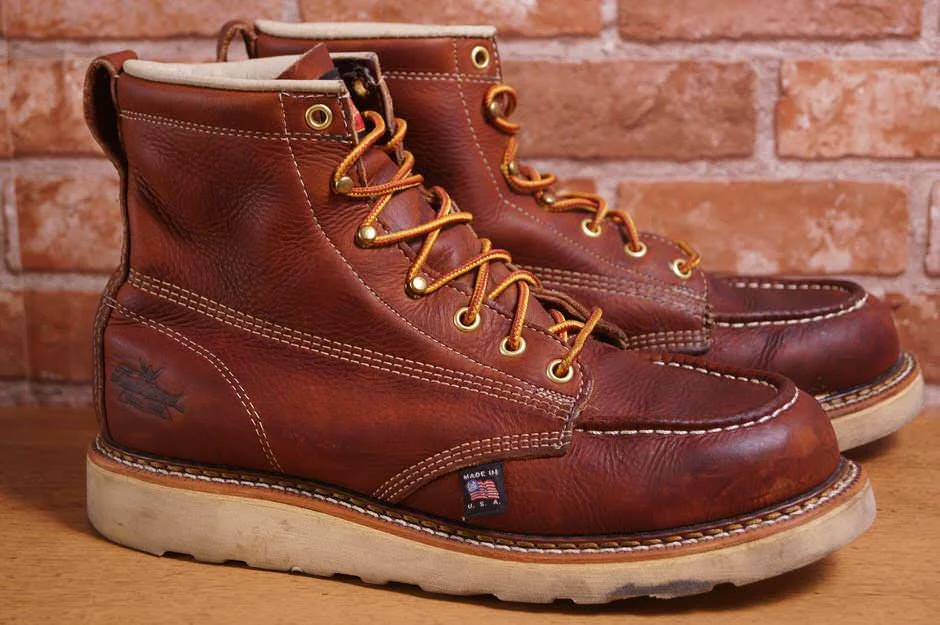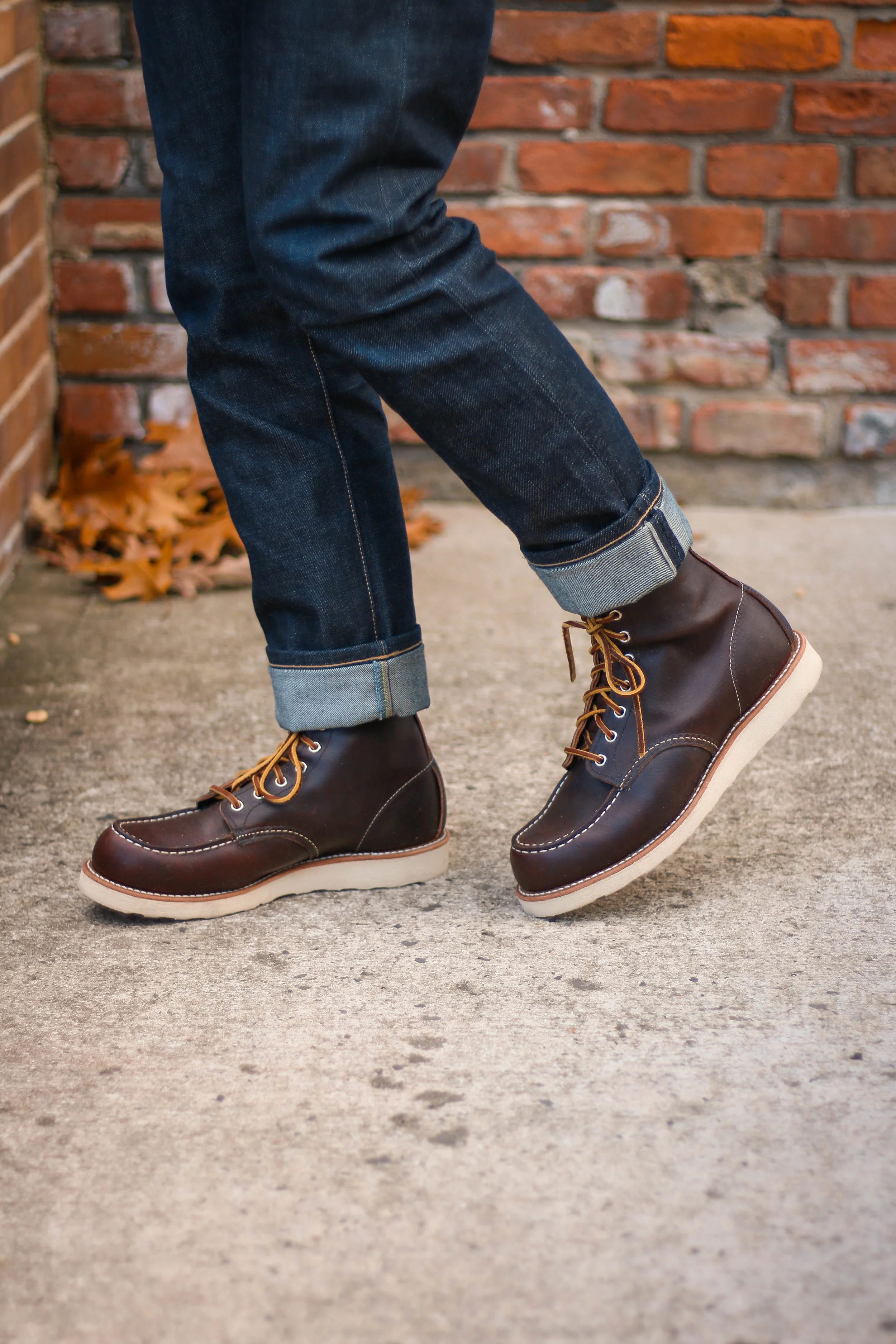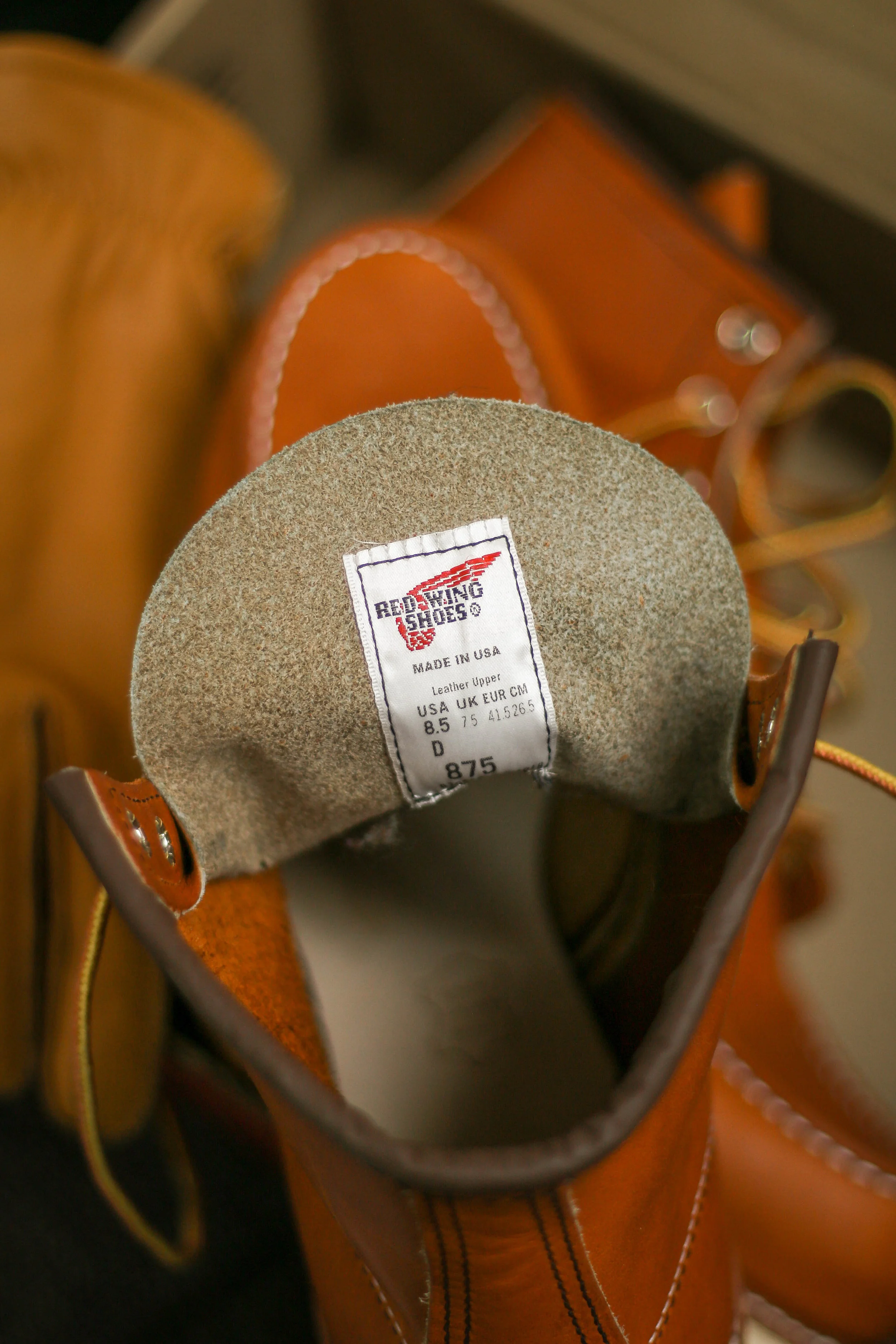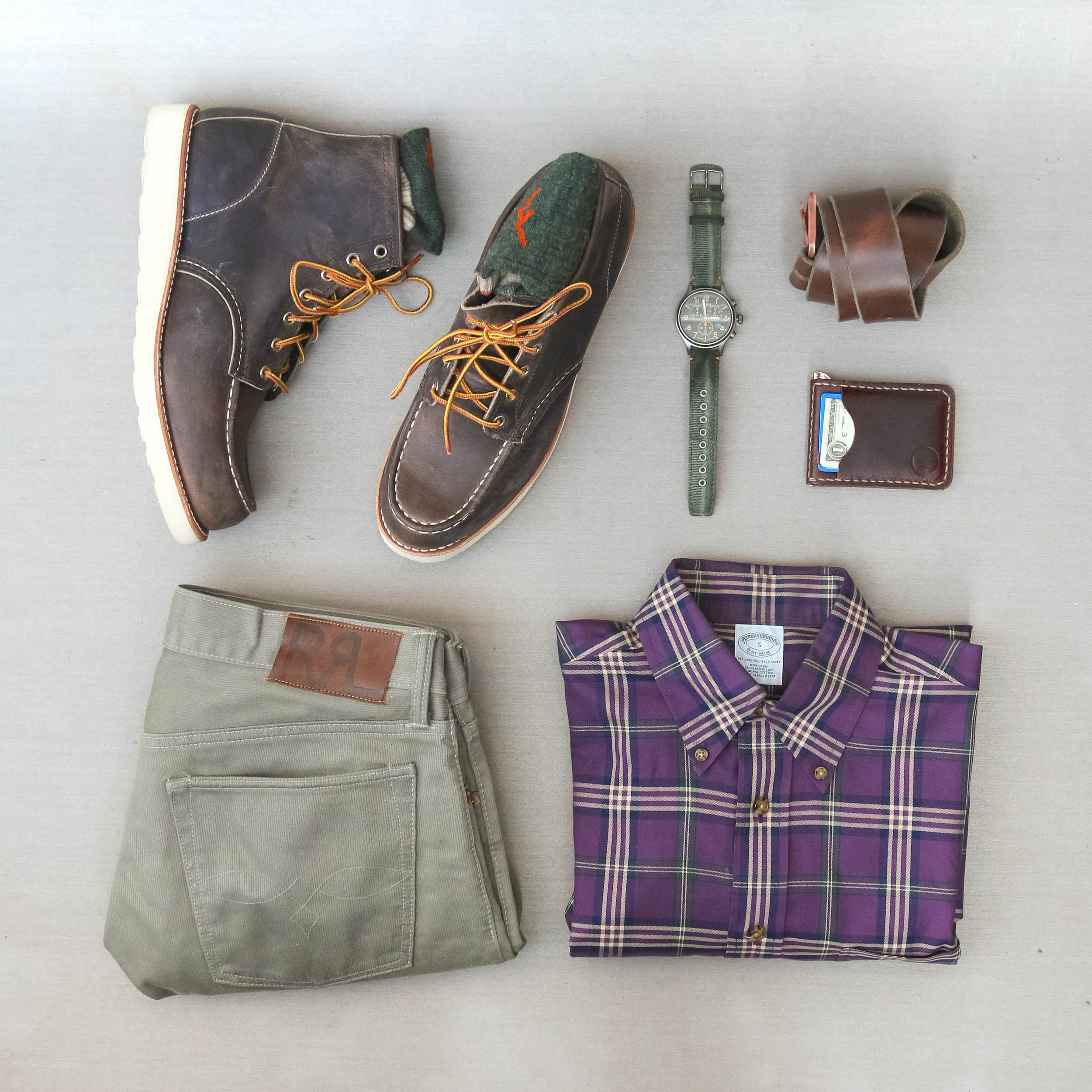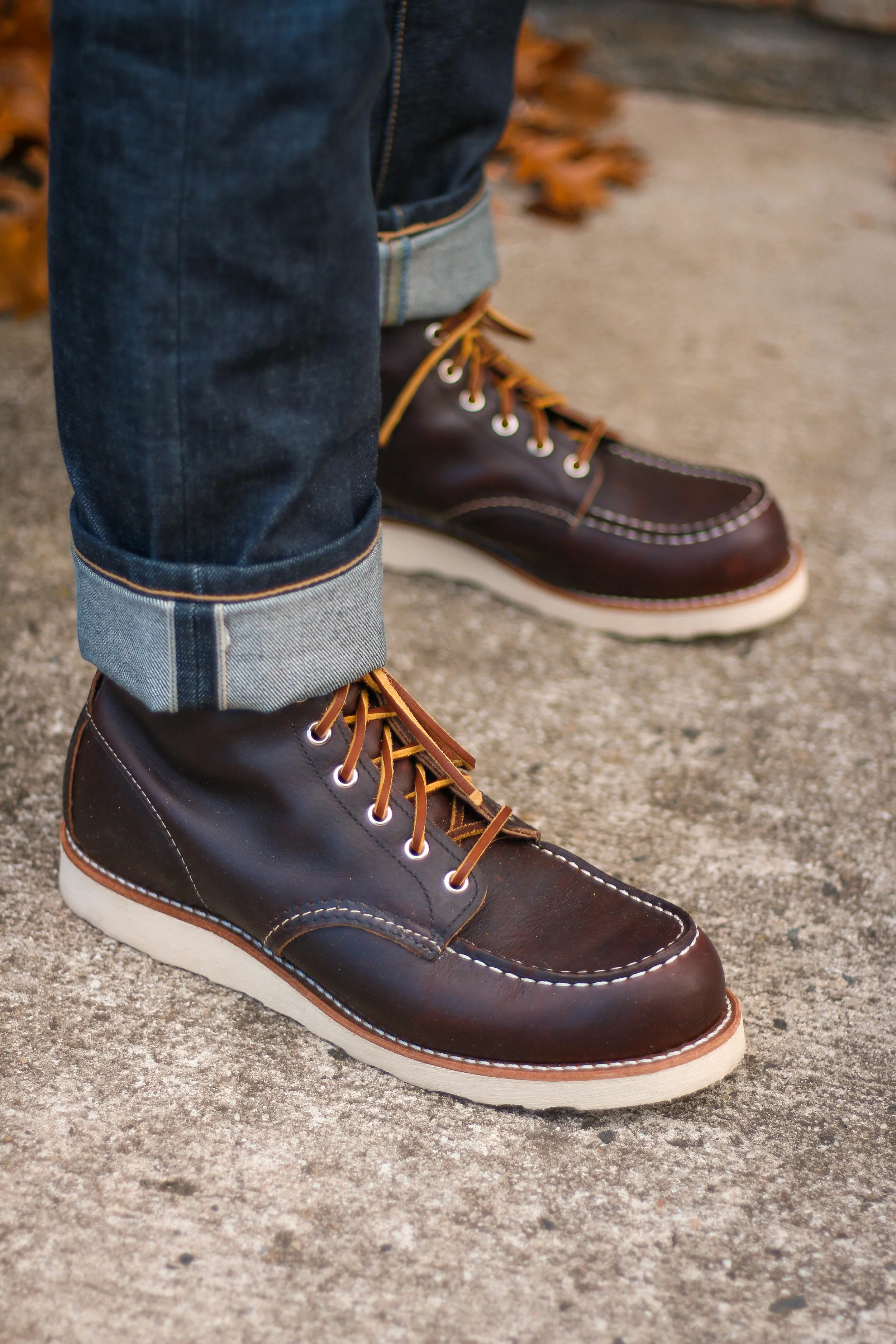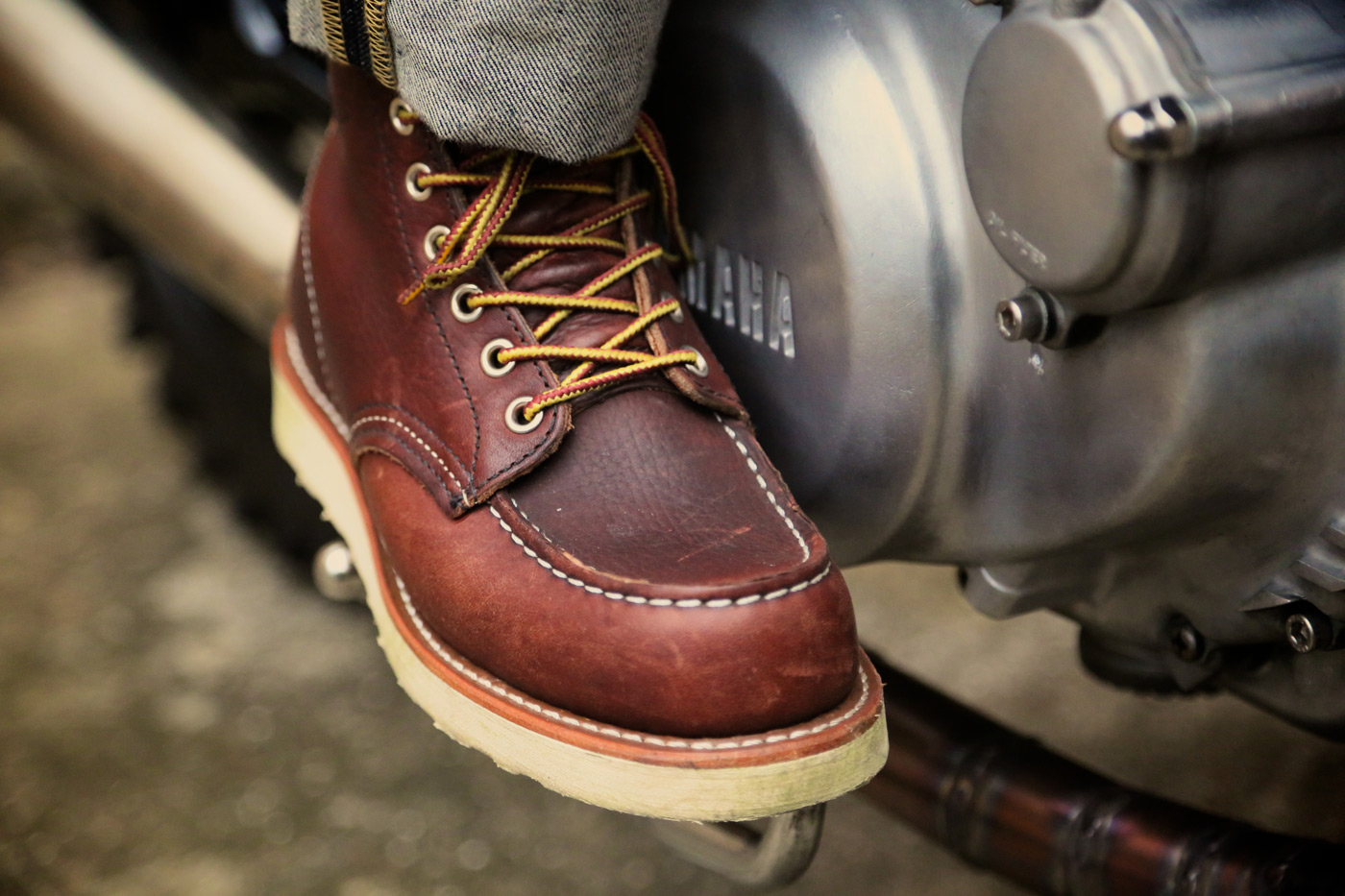Which is Better? Red Wing Heritage Moc Toe vs. Thorogood All American Moc Toe
Taking an in-depth look at the classic Red Wing Heritage Moc Toe and the Thorogood All American Moc Toe to figure out which is right for you!
Thorogood Moc Toe
If you’ve been finding yourself drooling over classic 6-inch Moc-Toe heritage boots that have become increasingly popular, you've probably caught yourself staring at two of the best on the market: Red Wing Heritage Moc Toes (likely the 875, 8138, 1907) and Thorogood American Heritage Moc Toes.
Red Wing Moc Toe, in Briar Oil Slick leather, my personal favorite leather from S.B. Foot Tannery
Both are awesome, goodyear welted boots that come from beloved brands, each with rich histories. Red Wing still makes their boots in their Red Wing, Minnesota factory as they did in 1905, and Thorogood is an employee owned and has been producing boots in Wisconsin since 1892.
But if you’re going to buy one pair which should it be? Although at first glance these boots look really similar to each other, in my opinion they actually are quite different and serve very different functions. So let’s break down these boots by detail and help figure out which one is right for you!
Leather
Probably the most obvious factor when choosing your moc toe is the leather. The leather quality and type will not only determine how your boots look and feel, but also how long they will last.
Red Wing produces all of its leathers in their own tannery, S.B. Foot Tannery down the road from their boot factory. That means that they can offer really high quality leathers for their boots (while keeping costs down) whereas other brands need to source their leathers from outside tanneries.
The most popular and oldest model of Red Wing Moc Toe, the 875. The leathers S.B. Foot Tannery produces are among the best in the world
All of the leather you’ll find on Red Wing boots are absolutely gorgeous. I still remember the first time I opened a Red Wing Heritage box and was absolutely blown away by the feel and look of the leather. Most leathers are oil-tanned and come with a waxy, smooth finish that makes these boots easy to care for, and sweat and water resistant without any initial treatment. Their popular Briar Oil Slick leather (8138), rough and tough (1907), are very soft right out of the box and the leather really doesn’t need much break in. Their Oro-Russet leather (875) on the other hand, is a bit more stiff and rigid and will require a bit more break-in although still not as much as their harness leathers, named after their original purpose; horse-riding saddles and harnesses.
You can see the beauty of the unlined leather, and leather insole. The tag also deploys the M/Y it was made, and the model number. They have nothing to hide!
The boot is also unlined, meaning the inside of the boot does not have a smooth, thin piece of leather attached to underside of the outer leather. Rather, the inside of the boot is the underside of the outer leather, making the boot more breathable but less insulated.
Thorogood leathers on the other hand, are a bit different from Red Wing’s. They have leathers that nearly match the aforementioned Red Wing leathers aesthetically, including their Crazy Horse (compares to Copper Rough and Tough 1907) and my personal favorite, Black Walnut (compares to 8138 Briar Oil Slick), their signature model is the Tobacco leather, which rivals the Oro Russet 875.
Although these leathers look similar to Red Wing’s, these leathers have a more tumbled finish which results in a much softer and more supple feel. Most Red Wings as long as they are factory firsts, come with a very tight grain which in my opinion has a better look, whereas the Thorogood has a grainier look. However, this results in a much more malleable leather that requires almost no break in, and many anecdotal reviews found on Amazon can attest to that fact, even declaring their switch from Red Wing to Thorogood for this reason.
Like the Red Wing counterpart, the Thorogood boot is also unlined on the inside but does feature a padded collar around the ankle. This may not seem like much, but the biggest challenge for me while breaking in my Red Wings was the chafing caused by the stiff, unpadded collar. This small extra detail will make that process much less painful while adding a bit of bulk to the boot.
Sole and Insole
The insole on the Red Wing Moc Toes is made of a stiff leather which covers a cork filling, This is a very polarizing factor for a lot of people with sensitive feet, or for people who move a lot during work. The insole will compress over time and conform to the shape of the wearer’s foot, but can be a painful and lengthy process. For me though, I found the hard insole to be supportive and personally prefer this type of footwear break-in, which is also found in popular dress shoe brands like Allen Edmonds and Alden. For me and for many others, the boot only gets more comfortable over time, as the footboard and surrounding leather conforms and hugs my foot perfectly. Additionally, the hard leather insole is easy to recraft when resoling.
On the other hand, Thorogoods come with a removable foam insert which covers a Poron cushioned footbed. This results in a much softer feel, which feels much closer to an athletic shoe than its Red Wing rival. The fact that the insert is removable makes these really simple and inexpensive to replace if the insert is damaged or get too stinky. On that note, I find that due to the nature of my sweaty and stinky feet, the synthetic insert really retains sweat and stink more than the Red Wing leather footboard, which is a big deal for me, and I know for a lot of other people too. However, for those who use a lot of energy bending, climbing, and stomping, the cushion insert provides a lot of much needed shock and impact absorption.
Red Wing’s Sole
The outsole for both of these boots are made by their respective brands and are both made from a cooled rubber foam. The difference seems to be quite arbitrary and quite honestly, I don’t have enough experience to say that one is better or more long lasting than the other. Both should last years before fading out and requiring a resole. However, I’ve seen complaints from customers of both brands citing a cracking or crumbling of the sole, which is quite frankly, the nature of a rubber outsole. I don’t the sole should play much into the decision here.
Thororgood’s Sole
The wedge sole of the Thorogood is actually storm welted on meaning there is actually a double-welt holding the sole to the leather upper. Only the Red Wing 1907 has the storm welt. While perhaps not as functional as it appears, the storm welt does add a level of sophistication to the boot. I especially love the contrasting brown welt found on the Thorogood Black Walnut boot!
One final note on the sole construction of these boots is the use of a shank. Red Wing moc toes do not have any shank, whereas the Thorogood boots have a fiberglass shank. This shank can be a big help with regard to strength and stability for the wearer and guys with a heavier workload will want to utilize that feature.
Visual Style
As you can probably tell by now, the Thorogood Moc Toes, while visually appealing, seem to be garnering a more functional appeal compared to the Red Wing Moc Toes, and this is reflected in the silhouette and detailing of the boot itself. Red Wing has no branding on their exterior which lends itself to cleaner lines and actually has a sleeker fit and look (if such a word can ever be used to describe a moc toe!). Stitching, aside from the Puritan triple-stitch (which contains a contrasting cream thread) and moc toe stitching, is kept to a minimal.
On the other hand, Thorogood is clearly proud of its American heritage and proudly flaunts both the USA flag tab and Thorogood branding on the side of their boots. Their branding is loud and almost impossible to unnoticed. For this reason, it is implied that the wearer of a Thorogood boot must feel that same sense of pride first and foremost when putting on their boots everyday. Perhaps that reminder that these boots came from the hands of a union laborer will subtly inspire the wearer to continue the chain of hardworking, All-American pride into whatever project he or she sets out to do that day.
The Thorogood boot also has a puritan triple stitch running alongside the entire vamp of the shoe back to the heel cup in a contrasting cream thread. This gives the boot a louder and prouder voice while displaying quality and functionality over subtlety.
Value
Ultimately, both of these boots are icons for good reason. But if I had to pick the better value, it would have to be Thorogood coming in at just a hair above $200, compared to the Red Wing’s $280. For the hardcore boot-wearers out there, the consensus seems to be that Thorogood is just as hard wearing, but provides the stability and cushion due to the shank, extra padding, and softer leather and sole when compared with the Red Wing moc toe.
Recommendation
In my opinion, despite looking so similar, the two boots really serve two totally different functions. The Thorogoods seems to be the dominant choice among blue collar workers who need the extra support and are proud to flaunt the American branding which adorns this boot. Everytime I pass a New York City construction worker on the street, they are wearing their beat-up Thorogoods. It also helps that Thorogood also offers their moc toe in a steel toe! Needless to say, Thorogood seems to have acutely branded themselves as the more macho, beefy brand and I think their product reflects that image with bull’s eye-accuracy.
On the other hand, I personally opt for the Red Wing moc toes regularly because I am a very style conscious buyer and the cleaner and slimmer look of the Red Wing moc toe is the better looking choice. This boot can handle tough jobs (as many die hard fans have repeatedly reminded me!) but it also can fit right in at the bar. The leather is without a doubt more luxurious on all Red Wing models and the hard leather insole is great for walks and a casual workload. Because I want my boots to look great, and because I prefer the leather insole to the cushioned insole, the Red Wing gets my vote.
If you wear your boots hard, go for the Thorogoods without a hesitation. If you are looking for a beautiful boot that will look good for years to come, go for the Red Wings.
PS: Use this link to Red Wing’s own site tot help support my blog!
